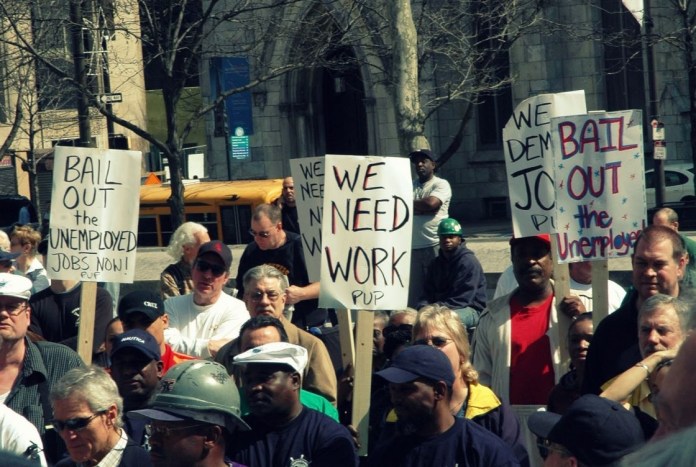Mainstream economics consistently fails to predict the future. I’m talking about those ‘schools’ of mis-thought, ranging from Paul Krugman on the ‘left’ to Glenn Hubbard and other apologists of business and neoliberalism on the ‘right’.
One of the favorite myths they perpetrate is that ‘wages are sticky downwards’. That means that in conditions of recession or worse, because workers won’t accept lower wages the recession tends to continue. If only workers would allow wage reductions it would mean business would have more disposable income (from wage cost savings) on hand. Business would then reinvest the extra income. Investment would rise. Workers would be rehired. Wage income would then recover and the economy would grow from more investment and consumption.
This fiction has ruled for more than a century. The economist John Maynard Keynes debunked it in the 1930s. But it was retained by the mainstream economics profession nonetheless, even to this day. Just read most of the entry college level textbooks. It’s still there. Along with at least a dozen other false propositions (like free trade benefits all; inflation is caused by too much money chasing too few goods; income inequality is due to workers not educating themselves and making themselves more productive; business tax cuts create jobs–and a host of other nonsense statements with no support in reality).
The notion that ‘wages are sticky downward’ is a clever way to argue that workers are responsible for the lack of a quick recovery from a recession. If they only would reduce their wages it would all be ok in a short while.
But take a look what’s going on right now. As of late May 2020 at least 45 million American workers are unemployed. In just two months they have lost $1.3 trillion in income. More than $1 trillion due to unemployed. Another $260B due to shorter hours of work. That’s a wage reduction of -$1.3 trillion! As in all recessions, workers do experience severe wage reduction–in joblessness (no wages), shorter hours of work, cuts and loss of benefits, lower pension contributions by employers, wage theft, etc. etc. So wages do fall, and are falling today faster and deeper than ever. And is business and investors spending and investing given the wage reductions? No. They’re hoarding the $1.74 trillion in Congressional loans and grants bailouts. And hoarding the $650 billion in business tax cuts also in the bailout legislation thus far (which one hears very little about in the media, I might add).
As journalist David Cay Johnson just revealed in a piece today, the short term cash deposits by business in just institutional money funds (only one source) has risen from $2.3 trillion before March 1, 2020 to $3.3T today. That’s a $1T rise in cash deposits by businesses, just in institutional money funds. More is being deposited in commercial banks. The long run average of business deposits in commercial banks has been around 5% (6% under Obama and 4.6% under Trump 2016-19) to 15.8% since March 1. Businesses and investors are hoarding their cash and stuffing it in their short term accounts in banks, funds, and who knows where else, on and offshore. No doubt some of that will be committed at some point to stock buybacks, dividend payouts, mergers & acquisitions, derivatives speculation, and all the rest of the financial gambling that in the 21st century defines capitalism. Don’t expect much to get into real investment that increases production, requiring the rehiring of workers, that generates wage incomes.
So wage cuts and reductions, now underway, will not result in renewed business investment and general rehiring of the 45 million laid off. Wage cuts don’t result in real investment and growth.
The nonsense economics notion that wages are sticky downwards is just pure economic bullshit today, as it has always been! And so is the parallel mainstream idea that if you can just find a way to boost business cash (via tax cuts or bailout loans) it will lead to economic recovery as well.
Dr. Rasmus is author of the recently published book, ‘The Scourge of Neoliberalism: US Economic Policy from Reagan to Trump’, Clarity Press, January 2020, where the empirical record on wages, investment, taxes, employment thoroughly debunks the various myths and misrepresentations of mainstream economics.
Source: Jack Rasmus
